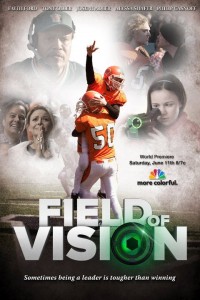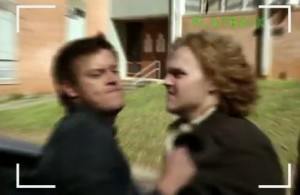Social Worker Review: “Field of Vision”
Social workers who watched an advance copy of “Field of Vision” said NBC’s made-for-television movie, which aired on June 11, accurately depicts bullying and the plight of foster children and could encourage young people to speak out against mistreatment of others.
“I believe it could influence youth to be more tolerant,” said David Shrank, MSW, who has worked with young children in the past but is currently an integrated case manager for the mentally ill in Trenton, NJ. “The movie was fairly accurate in showing the issues faced by a teen that has been in foster care.”
Despite generally positive feedback there was some criticism of the film.
Margaret Lorenz, MSW, a social worker from Floral Park, NY who has worked in schools for 15 years, said the characters in “Field of Vision” were “hokey” and the clichéd plot would turn off her middle school students.
“I did not like the movie — not at all,” she said.
“Field of Vision” is the latest in a series of Family Movie Night Films sponsored by Proctor & Gamble and Walmart and supported by Moms4FamilyTV.
Social workers are some of the nation’s leading experts on bullying and foster care. Officials at Moms4FamilyTV reached out to the National Association of Social Workers to get social workers’ opinions on the film.
“Field of Vision” centers around Corey (actor Joe Adler), a shy yet smart foster child who must adjust to a new town and school, and Tyler McFarland (Tony Oller), the popular captain and quarterback of a high school football team on the cusp of winning the state championship.
Corey, who keeps a cherished photo of his dead mother with him at all times, joins the football team but is soon bullied by some of his teammates. Tyler must decide whether to keep silent or report the bullying and jeopardize his team’s championship bid.
Tyler’s mother Jody (Faith Lord), who is also the high school counselor, tries to help Corey acclimate to his new environment, learn more about his deceased mother, and find the birth father he never knew. And Tyler’s little sister Lucy (Alyssa Shafer) has a magical video camera that shows images that confirm Corey is being bullied and offer hints to where Corey can find his father.
“I loved the movie,” said Artan Hughes, MSW, a school social worker from Detroit. “It started out slow and I was confused about the video camera but when things started picking up I was on the edge of my seat to see what was going to happen next.”
Francine Parker, LMSW, a certified school social work specialist from Hutchinson, KS, said some of the scenes in the movie of family members kissing each other, eating together, and reading at bedtime were a bit Pollyannaish. Still, it was wise for filmmakers to include the scenes to show young people what family relationships can be like, she said.
Parker said children will also get a better picture of what it is like to be a foster child who may be grieving a dead parent and absent siblings and compelled to live in the homes of strangers in unfamiliar communities.
“Youth may see they take their family relationships for granted,” Parker said.
Lois Swearington, MSW, just ended her master’s degree internship at two schools in Los Angeles Unified School District 8. Bullying was also the subject of her research proposal this past year, she said.
Swearington said the use of football in the film is a good way to draw in young people, especially middle school children. She also said Tyler’s decision to do what is morally right or what is best for self is a good lesson for children, although Lorenz said Tyler’s character is so “heroic” it would be difficult for anyone to believe he was conflicted about helping Corey.
“I think it was a great concept because that is something that teens will not only be faced with in school but as they enter the work field as they get older,” Swearington said. “This seems like a great family movie that can start conversation in small groups or classrooms.”
Two National Association of Social Work staffers who reviewed the movie, Bekki Ow-Arhus, MSW, LICSW, and Kamiilah Omari, MSW, LLMSW, also thought the portrayal of bullying was accurate. However, they had serious concerns about the actions of Jody, the school counselor and mother of Tyler and Lucy.
Jody actions may have violated ethical and regulatory rules in some states, they said. These violations included discussing Corey’s case with her family, talking to Corey about his foster care status and deceased mother in a hallway where other students could hear, and independently searching for Corey’s birth father without consulting the courts or a social worker who may have handled his foster care case.
“She had huge confidentiality issues,” Ow-Arhus said. “All that private detective stuff was inappropriate.”
“If they are going to truly portray the reality of school personnel having to deal with a foster child and finding out information about biological parents and connecting them to biological parents, they have to connect to that system (social workers and the courts),” Omari said. “That is not optional.”
The filmmakers could have gotten around this problem by having Jody mention that she consulted with authorities before attempting to connect Corey with his birth father, Ow-Arhus and Omari said. Still, the two social workers liked the movie and thought it was uplifting and educational.
“Corey was dealing with what a lot of foster kids or kids who have lost a parent deal with — grief and loss,” Omari said.
“It was an interesting movie and I liked the fantasy camera,” Ow-Arhus said.
To watch the “Field of Dreams” trailer click here.
Social workers play a vital role in helping young people overcome life’s hurdles. To learn more visit the National Association of Social Workers’ “Help Starts Here” Kids & Families Web page by clicking here. NASW has also taken a strong stand against bullying. To read more about NASW’s position, click here.
| Leave A CommentAdvertisement
5 Comments
Leave a Comment
You must be logged in to post a comment.






Will be interested in seeing the film. I couldn’t help but be bothered, though, at the sponsors of such a (what is supposed to be a wholesome) series. With as unethical as Walmart is in treating its employees, and how their practices and products are destroying our environment, I find it sad that people (especially social workers) will look past that and say, “Aw, how great that they are sponsoring this!” As far as Proctor and Gamble, the vicious animal tests they conduct reduce all credibility with me. As social workers, we need to have less tunnel vision and more awareness for the issues around us- both locally and worldwide- and act on them.
It is time to speak up, the rest of the world has to see that bullying underprivileged children must not occur at anytime. This movie will be a great tool for educating the bully-headed individuals and witness the pain of their poor victims, but in the end, these poor victims will get the proper help and support from the new advocates. Please watch “Field of Vision!”
I wrote another email and got angry and may have hit the wrong key and lost it or sent it. Anyway, I am going to watch “Field of Vision”, hopefully with my grandkids. I am a junior high counselor, LCSW and a birthfather. A few comments on the critiques of the movie:
1) You begin with criticism of the film. Shame on you! We need more good films, and your initial reaction is negative. You should share positive firsts and then the criticism. You, by your political decision, discouraged professionals from watching. We need more “polyannish films!” Kids watch way too much crap these days. They need to see how health families function.
2) Any film that deals with bullying is good for kids and professionals to watch. I have developed bullying programs, but how many movies did kids see on bullying this year. Probably none. When there is not enough on a topic, let’s not be too critical, but supportive and encouraging.
3) I think starting your review with criticism was a counter-tranference issue. The movie made you uncomfortable, so you want it censored! Shame on you. I think criticism is warranted and valid, but where you put it in the article is a political decision.
4) There was ethical criticism of the counselor for not being too confidential or over stepping boundaries by doing birthfather research without consulting with the social worker. A couple things:
-I am a birthfather and no social worker ever discussed my feelings so lets not assume the social worker profession. In the area of adoption, they have been unethical, lazy and advocates for the adoptive parents and the lawyers. Consult with members of CUB (Concerned United Birthparents) many who are social workers, and find out about the truth in social work and adoption.
Jim Shinn, again as I have not finished my critique of Socialworker.org movie reveiw of “Field of Visiion”. The movie addressed a birthfather of which I am one. Most media ignore us and this is the new Millenium. A film that mentions us, should be advocated for, not ignored or censored. I had a reunion with my son, over 20 years ago, and his was a successful adoption. I got no help from the social work profession but from CUB (Concerned United Birthparents). Historically, social workers have not advocated for birthparents. We still have closed records and adoptees still lack access to medical information about their birthfamilies. Shame on social work.
I could write more, but most of what I have written won’t even be published. If you want a “birthfathers” view of social work, there is lot more I can write, from both macro and micro perspectives. Today local social workers are still retarded in their awareness of issues related to foster care and adoption, and there is still much to work to be done. You critique, did not help in the battle. Thanks for nothing! jim shinn 760-353-5059
I saw the movie. I disagree with your analysis. As as a school counselor and social worker, you do not have to consult with the “system” in order to “do the right thing.” The counselor in the movie had to go outside her job description, because the social work system did not do their job. The birthfather could have been found, but rather than do that, the social work “system” just put the kid in foster care. The movie “would not make others more tolerant” (a pro-gay statement that had nothing to do with the movie!), as was stated in your critique. Your criticism, discouraged folks to see the movie, which actually portrayed Christian foster parents in a positive, supportive light. I know great, positive Christian foster parents, but the anti-Christian bias of this site was evident, so your analysis, makes people less tolerant of people of faith.
Your analysis cited the counselor for violating confidentiality by talking with her family. Well two family members had a relationship with the victim of bullying and she really didn’t share information that the victim hadn’t shared with the son of the counselor. Lazy social workers often, just sit back and be critiical of others, who choose to work hard and do the right thing. Most of your positive comments were valid though.
Thanks for letting us know about the movie, but I question the training of your film evaluators. I am a social worker, who studied film and I have directed three vidoes for Latino youth which have been positively evaluated by students, parents and educational professionals. If you want a more professional, unbiased film evaluation, I will volunteer in the future. Jim Shinn LCSW 760-353-5059